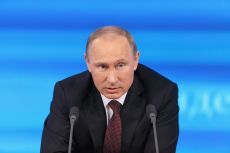by Peter T. Coleman and Robert Ferguson
Weeks after a chorus of international outrage erupted over the annexing of Crimea and the downing of Malaysia Airline’s Flight 17 in pro-Russian rebel airspace in Ukraine and the death of 298 civilians, Russia is unapologetically sending new military convoys equipped with mobile artillery into “sovereign” Ukraine. With growing causalities on the ground and increasing sanctions against Russia, Vladimir Putin appears steadfast in his determination to reclaim large sections of Ukraine – in particular its industrial heartland – through intimidation and violence, while denying any but humanitarian involvement there.

This begs the question: Is Putin psychotic?
In a word, yes. Perhaps surprisingly, this is not merely due to some fatal flaw or narcissistic character disorder, but rather a syndrome that results from having too much unchecked power for too long. We call it power psychosis because it entails actually losing touch with reality. Many of the despots of our world running malevolent states, businesses, cults, religious sects, terrorist cells, and criminal organizations share this particular brand of delusion. In fact, decades of research have shown that many of us in high power – the wealthy, the famous, the strong, the politically advantaged, and those in positions of high authority – tend to become increasingly susceptible to forms of power psychosis.
It works like this. The longer people remain in high power, the more they process information abstractly, perceive other people in instrumental and stereotypical terms, become more self-confident and less inhibited, make riskier choices, and have reduced capacities for complex social reasoning and moral judgment. They also become less likely to adopt someone else’s perspective, are less-accurate judges of other’s emotions, and recall less correct information about subordinates. They even begin to see other people as physically smaller.
In time the powerful can develop a sense of superoptimism, a form of hubris where they feel they can do or say whatever they want, often moving to evermore egregious violations, believing they can’t be caught or punished. Of course this occurs within cultures, institutions and norms that allow it to run unchecked.
When the powerful find themselves in disputes with others, their delusions really kick in. People in high power tend to become very comfortable adopting a domineering conflict style and often lose the capacity to respond in other ways. They monopolize speaking time and speak out of turn, are much more likely to express their private opinions and true attitudes, and are much less affected by the expressed attitudes or persuasion attempts of others. They also pay less attention to lower-power disputants, overestimate their own power and underestimate the power of others, fail to sufficiently understand the disputes they face, and are more inclined toward breaking rules and laws.
In a study of high-level international negotiations, scholars found that the more powerful countries’ negotiators typically neglected to think about power differences at all. If they did, they usually operated on the assumption that their superior aggregate power was sufficient to allow them to prevail in negotiations, and so they paid little attention to the specific types of leverage their lower-power adversaries might employ. As a result, those in high-power often lose in negotiations and conflict – they don’t get what they want, waste time, and fail to create value. They get stuck in a take-it-or-leave-it or take-it-or-suffer mode. Sound familiar?
In contrast, many of our most renowned world leaders learned to swim against this tide. Nelson Mandela, Vaclav Havel, Angela Merkel, Mary Robinson, and Nobel Peace Prize laureates Leymah Gbowee and Aung San Suu Kyi, to name a few, showed much more adaptivity in conflict. Rather than holding fast to a take-it-or-suffer mode, they responded to different disputes with diverse strategies, artistry and flexibility in a manner fitting with the situation, and knew to reserve confrontation and domination for those times when it was really necessary. In other words, they had what we call high Conflict IQs. They read situations more carefully, considered their short and longer-term objectives, and then employed a variety of different strategies in order to increase the probabilities that their agenda would succeed. They knew the difference between a temporary dispute and a long-term war. They knew when to stay the course and when to change strategies.
In a series of studies being published in the Journal of Organizational Behavior this fall, we found that more adaptive leaders and managers have significantly higher levels of self-efficacy and well being at work, assessed through measures of satisfaction with work in general, with coworkers, job-related affective well being, and lower intentions to quit their jobs. This was even true in one study conducted with managers in South Korea, where being adaptive (using different strategies which fit different situations) even trumped a more prevalent use of cooperative, collectivist conflict strategies.
We have found that more serious problems typically arise when leaders become fixated on any one approach to conflict (such as dominance) or when their chronic strategy fits poorly with the changing demands of situations. Even being overly benevolent in the face of conflicts with your subordinates all the time can undermine authority, decrease morale, and leave staff confused and demotivated. As Charles Darwin reportedly said, “It is not the strongest of the species that survives, nor the most intelligent, but rather the one most responsive to change.”
Today, the people of North Korea, Syria, Zimbabwe, and the Ukraine, to mention a few, continue to suffer from the rule of power-psychotic despots. As Forbes reported recently, “The planet remains beset with enough dictators to darken the days of millions under their thumb.” What the world needs now is a new generation of adaptive leaders raised on a steady diet of integrity, flexibility, skill and compassion for the needs and interests of others. When this is coupled with state governance and an international community capable of providing the checks and balances necessary to inhibit power madness, the world will be a brighter place.
Unfortunately Putin, like many superoptimistic leaders, is stuck in a domination vortex; a self-reinforcing dynamic fueled by his personality and by the social-cultural and political conditions he currently resides. And it will likely fall on the Russian and Ukrainian people, the EU and the rest of the international community to break through this psychotic episode through a steady diet of reality (data on the negative economic trends, casualties, and downward opinion polls), corrective action and perseverance.
Peter T. Coleman, PhD, is Professor of Psychology and Education at Columbia University, Director of the International Center for Cooperation and Conflict Resolution, and co-author with Dr. Ferguson Making Conflict Work: Harnessing the Power of Disagreement (September 2014, Houghton Mifflin Harcourt).
Robert Ferguson, PhD, is a psychologist, executive coach and author.




